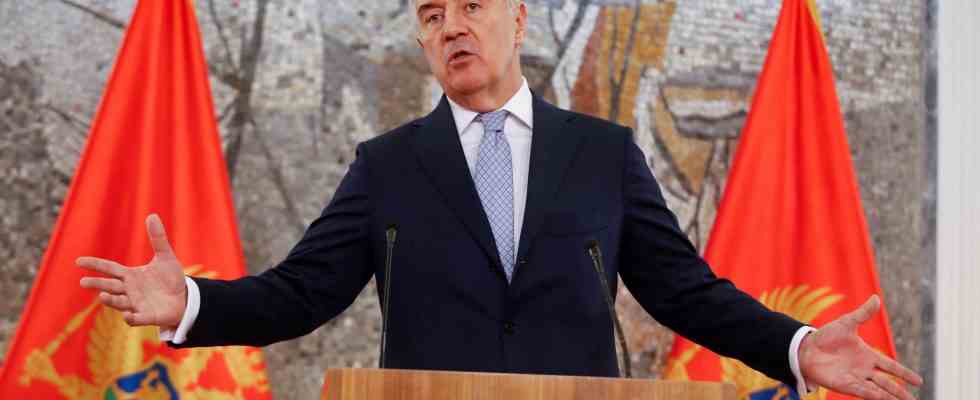Status: 03/19/2023 07:34 a.m
Montenegro elects a new president. Shortly before, incumbent Milo Djukanovic dissolved parliament. So there will soon be early parliamentary elections. How come?
Politically unstable conditions have prevailed in Montenegro since August 2020 – since the last parliamentary elections, in which the Democratic Party of Socialists, DPS, under long-term party leader Djukanovic, was voted out. After 30 years in power. During this time, Djukanovic was the formative political figure in the country with only around 620,000 inhabitants. He was prime minister four times and has been president for the second time since 2018.
Djukanovic led Montenegro to independence. The country had previously formed a state together with Serbia. After independence, Montenegro became a member of NATO and an EU candidate under Djukanovic. For a long time, the republic on the Adriatic was considered a pro-Western model country in the Western Balkans. The white pebble beaches and charming old towns led to a tourism boom. According to the World Bank, economic output has more than doubled since independence in 2006.
EU accession talks quickly stalled
But even under Djukanovic, the EU accession talks stalled. The main reason is the sluggish fight against corruption and organized crime. Djukanovic’s political opponents accuse him of being involved in both. The fact is: Djukanovic’s family is very wealthy. According to the Montenegrin media, the names of Milo Djukanovic and his son also appeared in the “Pandora Papers”.
When Djukanovic’s DPS party got only 40 of 81 seats in parliament in the 2020 general election, the remaining parties forged a coalition. They wanted to ban the DPS from power. The coalition consisted mainly of pro-Serb forces.
The most important of these is the Democratic Front. University professor Zdravko Krivokapic, who was close to the Serbian Orthodox Church, became prime minister. However, in order to bring pro-Western small parties into the alliance, most ministerial posts were filled with experts.
Several votes of no confidence
The alliance did not last long, the parties fell out, partly because of the standstill in the EU accession negotiations. A small party with four seats, the URA under then-Vice Prime Minister Dritan Abazovic, and Djukanovic’s DPS voted no confidence in the government in February 2022. Abazovic became prime minister and from then on was tolerated by Djukanovic’s party.
This government did not last either. Triggered by a dispute over the position of the Serbian Orthodox Church in Montenegro, Abazovic was overthrown in another no-confidence vote last August. Since then he has only been in office on an interim basis.
allegations of violating the constitution
After the failure of the government, the president, i.e. Djukanovic, should have commissioned a candidate to form a government. However, Djukanovic refused. Such a situation has never existed and is not regulated by the Montenegrin Constitution or other laws.
Djukanovic’s opponents accused him of violating the constitution with his blockade. As a result, Parliament amended the Presidential Powers Act and took over the authority to award government contracts.
Djukanovic signed the law in line with political practice, but said he would not be bound by it. He thinks it’s unconstitutional.
New parliamentary elections in Montenegro could lead to new majorities and a clearer balance of power – and thus help to solve the political crisis.
Image: AFP
Legal gray area
Because of the political blockade in Parliament, only three out of seven judges at the Constitutional Court have been filled for months, so it has not yet been possible to clarify whether the new law is constitutional. There are now six judges again, but no judgments have been made yet.
In the meantime, the political back and forth continued in the legal gray area: Parliament commissioned the ex-diplomat Miodrag Lekic to form a government on the basis of the new controversial legal situation. That was three months ago.
Complicated situation
During this time, Lekic failed to secure a parliamentary majority for his government proposal. Therefore, President Milo Djukanovic dissolved parliament on Thursday evening. So the situation is complicated.
The parliamentary elections could help to solve the political crisis. Diplomats from the USA and the EU had recently advised this. Majorities in Parliament could shift and lead to clearer balances of power. Among other things, through a new movement, Europa Now, which wants to leave behind ethnic lines of conflict and the old power struggle between Djukanovic and pro-Serb forces.
On hold: Montenegro and the EU
Helga Schmidt, ARD Brussels, March 17, 2023 6:01 p.m

